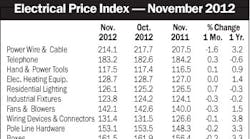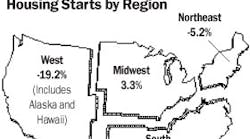After enduring one of the worst business years in recent memory, many respondents to the 2002 ElectroForecast survey were hopeful that the business climate would improve in the electrical industry.
As one might expect, survey respondents saw fallout from the recession and the 9-11 events as the two biggest obstacles that they face this year. While the general tone of the respondents was that business would pick up sometime around mid-year, several respondents said if terrorists attack the United States again in 2002, it could cripple any economic recovery.
Produced by the editors of Electrical Wholesaling, CEE News and Electrical Marketing newsletter, the ElectroForecast 2002 offers a quick snapshot of the issues that will confront electrical contractors, electrical distributors, reps and electrical manufacturers during the next year. It's not intended to be a statistically verifiable piece of research, but it does offer some interesting insight into what's on the minds of electrical professionals.
None of the electrical contractors, electrical distributors, electrical manufacturers or independent manufacturers' reps who responded to the survey believe the economy is in a free fall. Many see the current state of economic affairs as a traditional economic downtown that was made worse by the 9-11 attacks.
The fact that auto companies have cut down on construction has affected one electrical contractor, who also said his company's backlog was dropping, work had slowed and that there were more bidders per job.
Several other respondents agreed, and said that the problems the industrial market had in 2001 could spread to the housing and commercial construction sectors if the recession continues.
Distributors were split about this year's business prospects, with the majority looking at business to increase or stay steady with 2001. Only the most bullish distributors were looking at anything approaching 5 percent sales growth.
One lighting manufacturer is alarmed over the onslaught of lighting products that China and Mexico are importing into the United States, and said it was the greatest danger he sees for 2002.
Ray Schlosser, president, Aero-Tech, Schaumburg, Ill., said if he had all his distributors in one room for 30 minutes, he would tell them to buy American-made products to save jobs at their own companies and for their customers. “I hope America wakes up before it's too late,” he said. “We have lost too many industries already.”
A senior executive for one of the largest electrical companies said that if the recession extends beyond the first half of 2002, “the weak manufacturers and distributors will begin to fail. Right now, I don't think we will reach that point, but who knows,” he said.
Not all the reports on 2001 were bad. Jeff Sessler, vice president of sales, Nora Lighting, Commerce, Calif., said his business actually increased 15 percent because, “The top-heavy large corporations were not able to react to the sudden downturn.”
Rep respondents were the most optimistic in their evaluations of this year. Over half were looking at modest increases in business in 2002.
One Illinois-based rep said the downturn actually started in the fourth quarter of 2001, and that his company's industrial business was hit hardest. “If the interest rates continue going up and employment doesn't improve, residential will continue decreasing, which will not allow a rebound in 2002.”
Another rep, Richard Osborne, president, Richard Osborne Enterprises Inc., Lebanon, Maine, agreed that this business cycle isn't unusual, but that after the Sept. 11 attacks, “It was like we froze for two weeks.”
In the Bay Area, Rick Stanger, principal, Stanger-Boltz, Hayward, Calif., doesn't like what he is hearing about the dearth of work with design firms. “Engineering firms have told us there are very few new jobs being designed,” he said. “This will have a great impact in late 2002 and 2003.”
While manufacturers did not respond in the same numbers as distributors, reps and contractors, most that did were cautiously looking at single-digit growth.
Electrical contractors probably were the most optimistic of the bunch. More than half of the electrical contractors surveyed see their sales growing, but at pedestrian single-digit growth rates. The fact that auto companies have cut down on construction has affected one electrical contractor, who also said his company's backlog was dropping, work had slowed and that there were more bidders per job.
Several other respondents agreed, and said that the problems the industrial market had in 2001 could spread to the housing and commercial construction sectors if the recession continues.
New markets
Despite their concerns about the economy, electrical distributors' customers seem to be aggressively exploring new avenues of business such as datacom and specifically home networking. A surprising number of respondents saw alternative energy sources such as photovoltaics, wind energy and fuel cells as new market opportunities.
Other electrical professionals were exploring these new markets, too. Jimmy Jones, president, JJ Electric Agent Inc., a rep agency in Amarillo, Texas, said sales to wind farms developed into a nice piece of business for his company during 2001. “We were able to sell wire, cable, insulators and steel poles,” he said.
Although distributors' customers had different ideas on the new market opportunities that offered the most potential, they were in agreement on one area of the business: the need for distributors to get back to basics in how they service their needs.
Distributor-contractor relations
In one sense, the contractor-distributor relationship has changed over the years because e-business technologies and communications tools like Web-based ordering, online product specifications sheets, computer-to-computer links, e-mail and job-site ordering from personal digital assistants (PDAs) have allowed distributors to offer 24/7 service. But when asked for ideas about what would most improve their distributor relationships, contractors were strictly back-to-basics: offer better pricing, deliver materials faster and more dependably, stock a broader array of products in more depth and have knowledgeable salespeople.
While some of these suggestions would seem like Servicing Contractors 101, they were the most common responses for improving contractor-distributor relations in the 2002 ElectroForecast survey.
Said H.J. Druhl, owner, Guardian Electronics, an electrical contractor based in Lexington, N.C., “Distributors need salespeople who are knowledgeable of the products and can get prices and availability information to me promptly. Many times second and third calls are necessary to get this information.”
Other electrical contractors were more concerned with local inventory levels. Thomas North, owner, Miami Cove Electric, Garibaldi, Ore., would tell his distributors to, “do a better job of managing your inventory to put an end to back orders.”
Pricing and new product information were two key concerns for Dennis Kornel, owner, K&S Sales & Service, York, Neb. He needs electrical contractors to show more new products, keep prices as competitive as possible and provide more help for contractors on warranty parts.
One residentially-oriented California electrical contractor kept his suggestions short-and-sweet. “Get competent sales staff, know your products and keep plenty of inventory,” said Bob Ludecke, owner, Bob Ludecke's Electrical Services, Big Bear Services, Calif.
Manufacturer relations
Manufacturers' mergers and acquisitions were an across-the-board concern, and many reps and distributors are uneasy about ever-increasing clout of the largest manufacturers. Jim Schmidt, president of J.R. Schmidt and Associates, a Denver rep agency, said there was, “too much concentration of power in too few people and entities, many of whom do not truly understand our industry nor do they appear committed but for the short term.”
“As a rep, the continuing trend of mergers and acquisitions and consolidation is both a threat and an opportunity,” said Dennis Tulimeri Sr., president, Tulimeri Associates Inc., Glastonbury, Conn. “Reps must expand the market segments they serve.”
One South Carolina rep, who requested anonymity, had several interesting comments on the biggest trends of 2001 and the danger signals that he sees for 2002.
Along with the merger of electrical companies, and the ever-increasing importance of microprocessors, he said national pride was one of the biggest events of 2001.
Like many other respondents, he believes mergers will continue to have a major impact on the electrical business in 2002. Yet one of his other comments on danger signals may be even more intriguing. As electrical professionals plot their courses of action for 2002 amidst the questions about economic recovery, potential terrorist attacks, consolidation, e-business and new markets, he cautions others in the electrical industry to not: “mistake motion for action.”

